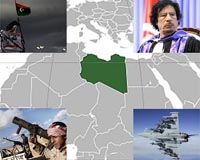| . |  |
. |
London (AFP) March 21, 2011 British Prime Minister David Cameron said Monday there was no legal authority for regime change in Libya despite suggestions by ministers that air strikes could target Moamer Kadhafi. After Kadhafi's complex in Tripoli was hit overnight in raids by Western forces, Cameron said the UN Security Council resolution was limited to include the enforcement of a ceasefire and no-fly zones to protect civilians. "It explicitly does not provide the legal authority for action to bring about Kadhafi's removal of power by military means," Cameron told the House of Commons ahead of a vote by lawmakers on the strikes in Libya. But he said the coalition still wanted to see the end of Kadhafi's iron-fisted 41-year-rule, adding: "Our view is clear -- there is no decent future for Libya with Colonel Kadhafi remaining in power." Lawmakers were expected to strongly back military action in a vote later Monday, after a second night of British attacks by fighter jets and a submarine in the Mediterranean alongside French and US forces. Nearby, about 200 supporters of Kadhafi staged a demonstration outside Cameron's Downing Street office, brandishing the Libyan leader's green flag and holding up placards reading "Stop bombing our families and children". Cameron has the support of his Conservative party and their Liberal Democrat coalition partners for military action, as well as the opposition Labour party. But there have been conflicting statements about the aims of the air strikes from ministers and from the British military, amid fears that Britain could be drawn into a ground war similar to the 2003 invasion of Iraq. Defence Secretary Liam Fox said Sunday that there was a "possibility" British forces could target Kadhafi. Foreign Secretary William Hague refused to rule it out Monday, saying "that depends on the circumstances at the time". But the head of the British military, General David Richards, said Kadhafi was "absolutely not" a target and UN resolution did not allow it, adding his voice to those of US and French officials -- and now Cameron's. Acutely aware of the controversy over Britain's six-year war in Iraq, Cameron repeated his argument that his first military action since taking office in May last year was "necessary, legal and right". He said Kadhafi had failed to adhere to the UN's demand for a ceasefire and coalition strikes "have helped to avert what could have been a bloody massacre in Benghazi". They had "have largely neutralised Libyan air defences and as a result a no-fly zone has effectively been put in place", he added. Cameron meanwhile called for NATO to take command of operations in Libya, as NATO allies struggled Monday to overcome divisions about the organisation's role in the strikes. "Over time we want this to transition to a NATO command, a NATO command and control using NATO machinery, so all the partners in NATO and all those who want to contribute from outside can be properly coordinated," he added. Cameron also addressed concerns about the lack of Arab involvement in the first wave of air strikes and criticism from the head of the Arab League, Amr Mussa, despite the organisation's support for the UN resolution. He spoke to Mussa earlier Monday and believed they were "on the same page" on Libya, his spokesman said. In parliament Cameron said Qatar was providing jets to enforce the no-fly zone and said the coalition would do "everything we can to encourage others to come forward." In the debate, Cameron also addressed concerns that Britain will be drawn into a lengthy ground war such as Iraq -- particularly when the country is still fighting a bloody battle against Taliban insurgents in Afghanistan. "This is different to Iraq... This is about protecting people, giving the Libyan people a chance to shape their own destiny," he said, adding that the UN resolution forbade any foreign occupation of Libya.
Share This Article With Planet Earth
Related Links
 UN Security Council opens new Libya session
UN Security Council opens new Libya sessionUnited Nations March 21, 2011 The UN Security Council began a closed-door meeting on Libya Monday, diplomats said, amid rising international criticism of air strikes directed at the regime of Moamer Kadhafi. Missile and air strikes launched over the weekend by US, British and French forces targeted Libyan air defense systems to impose a no-fly zone on Kadhafi's forces, and on Sunday demolished a building in the Libyan le ... read more |
|
| The content herein, unless otherwise known to be public domain, are Copyright 1995-2010 - SpaceDaily. AFP and UPI Wire Stories are copyright Agence France-Presse and United Press International. ESA Portal Reports are copyright European Space Agency. All NASA sourced material is public domain. Additional copyrights may apply in whole or part to other bona fide parties. Advertising does not imply endorsement,agreement or approval of any opinions, statements or information provided by SpaceDaily on any Web page published or hosted by SpaceDaily. Privacy Statement |